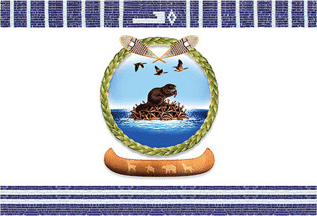 image
located by Dave Fowler, 19 July 2023
image
located by Dave Fowler, 19 July 2023Based on: https://www.gg.ca

Last modified: 2023-08-26 by rick wyatt
Keywords: huron-wyandot | quebec | native american |
Links: FOTW homepage |
search |
disclaimer and copyright |
write us |
mirrors
 image
located by Dave Fowler, 19 July 2023
image
located by Dave Fowler, 19 July 2023
Based on:
https://www.gg.ca
See also:
The Nation huronne-wendat is the only Huron / Wyandot nation in Canada. Until the mid 17th century, the Wyandot Confederation, made of 4-5 tribes, lived on a big territory stretching over modern Ontario and Quebec. The Confederation was disbanded in 1630-1650; most Wyandots were killed by epidemics or during the wars against the Iroquois. The survivors split into two groups, the Great Lakes Wyandots and the Hurons - Wendat; the latter group (c. 300 people) moved to Quebec, where they move from place to place until settling in 1697 in the
village of Lorette. The place, subsequently known as Village-des-Hurons, was officially renamed Wendake in 1986.
Wendake (c. 2,700 inhabitants), the center of a reserve (c. 1,100 inhabitants), houses the Conseil de la Nation (Nation's Council) huronne-wendat, made of the chiefs of the eight family circles constitutive of the Nation and of the Grand Chief.
www.pantherland.net - Pantherland website (in French)
www.wendake.ca/ - Nation's Council official website
Ivan Sache, 14 September 2010
The flag of the Nation huronne-wendat is white with the nation's emblem in the middle. The nation's emblem shows a beaver standing on a heap of branches and holding a green branch in its paw. The branches stand in the middle of dark blue water, under a light blue sky charged with a white cloud and seven geese.
archive.gg.ca (photo)
Ivan Sache, 14 September 2010
Blazon
Argent the Badge bordered in chief by the wampum belt of the
Huron-Wendat Nation and in base by a two-row wampum belt proper.
Symbolism
The wampum belt with the hatchet is the symbol of the alliance
between the Huron-Wendat Nation and the British Crown; it represents the hatchet
given by King George III in the 1760s. The other belt recalls the two-row
wampums of Haudenosaunee origin that emphasized the peaceful coexistence of two
nations walking in the same direction without interfering with each other.
https://www.gg.ca/en/heraldry/public-register/project/3472
Dave
Fowler, 19 July 2023
The Huron Wendat Nation's symbol represents its culture, territory and history. The symbol on the flag is accompanied by belts of wampum. The Bustards (large terrestrial birds) recall one of the most important beliefs of the Huron-Wendat Nation: the creation of the
world. While Yäa'taenhtsihk (Skywoman) fell from the celestial world, bustards gathered it on their wings and placed it on the carapace of Grande Tortue, the chief of the animals. The Great Turtle eventually became a wonderfully beautiful island, our Earth.
Canoeing and Snowshoeing represent the means of transport used for travel on the territory. The water, the source of life, forms the paths to follow between the division of territories. The Hut represents the community, homes and the roof that protects our families. It is also a symbol of strength and agility for work. The Circle and the Sweet grass – The Huron-Wendat see all the elements of nature interconnected. All life, including humans, animals, plants, spirits, etc. forms a whole called the Circle of Kinship. The sweet grass represents spirituality, medicinal plants and the forest. The Clans include the deer, the tortoise, the bear, the wolf, the beaver, the eagle, the porcupine and the snake. Five of these clans made up the great Nations of the confederation: the Attignawantans, the Attigneenongnahacs, the Arendaronons, the Tahontaenrats Daim and the Ataronchronons. Four (of the eight) clans are represented at Wendake reserve: the deer, the wolf, the bear and the turtle. The Beaver – The national emblem of the Huron-Wendat Nation, the beaver alone represents a clan. The most industrious of all animals, it is a symbol of endurance, intelligence and pride.
Esteban Rivera, 29 January 2018
Longer version of flag
 image
by Janis Lasmanis, 25 July 2019
image
by Janis Lasmanis, 25 July 2019
Based on: www.toronto.ca
.gif) image
located by Dave Fowler, 19 July 2023
image
located by Dave Fowler, 19 July 2023
Based on:
https://www.gg.ca
Blazon
A roundel Bleu Céleste charged with a beaver contourné gnawing on
an aspen branch and sejant on a lodge issuant from a base of water, in chief
three Canada geese volant contourné, the whole within a wreath of sweetgrass,
surmounted in chief by two snowshoes in saltire and set above a canoe carved
thereon a deer at gaze, a turtle naiant, a bear ambulant and a wolf statant
ululant, all proper;
Symbolism
The beaver, an emblem long used by the
Hurons, symbolizes work, endurance, intelligence and pride; it also represents
the Huron-Wendat Nation and its ability to adapt to its environment. The lodge
evokes the community and its strength. The Canada geese recall the story of the
creation of the world, in which the geese came to the aid of Aataentsic, the
mother of humanity, caught her when she fell from the sky and placed her on the
Great Turtle, which offered its shell as a place to live for all Indigenous
peoples. The sweetgrass symbolizes spirituality, medicinal plants and the
forest, essential elements for the Nation. The canoe and the snowshoes were
traditional modes of transportation. The deer, turtle, bear and wolf are the
emblems of four of the eight clans of the Nation.
https://www.gg.ca
Dave Fowler, 19 July 2023